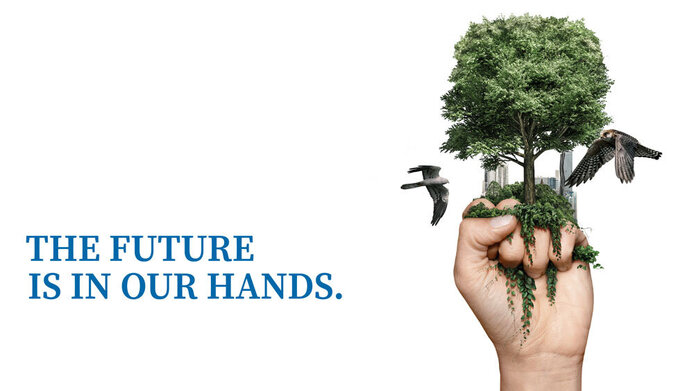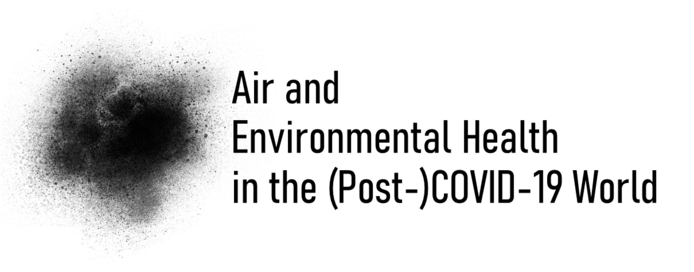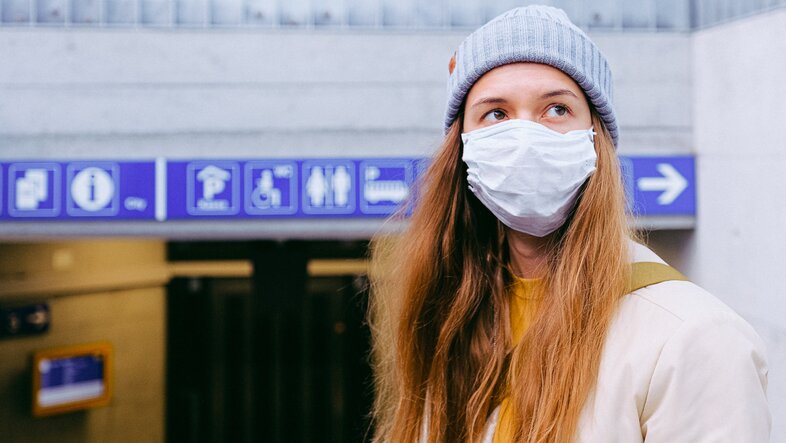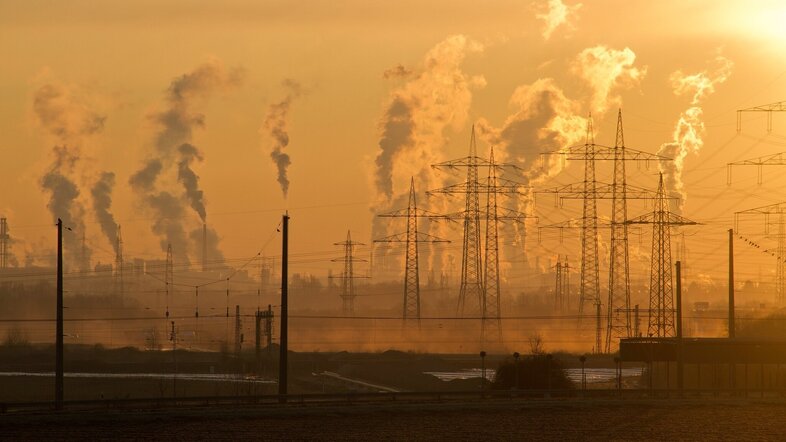When air becomes visible
Air is life. A person breathes in around 12,000 litres of air per day. The coronavirus pandemic has changed society’s relationship to the life-giving air that surrounds us, with airborne diseases evidence of interactions between humans and the environment. As such, air is understood as a vehicle for the transmissibility of viruses, be it COVID-19, RSV or influenza.
The cultural and literary studies scholar Tatiana Konrad from the University of Vienna explores these processes. "The coronavirus can be considered an emergent and culturally specific starting point for a variety of changed meanings of the term 'polluted air'," Konrad explains.
Why? The airborne coronavirus, much like various particles that pollute air, is invisible to the human eye. However, during the COVID-19 pandemic, air has gained a certain visibility precisely because of the virus, which represented a kind of "invisible danger," the researcher points out. She cites the introduction of protective measures, such as quarantine regulations or the wearing of protective masks, as examples of this visibility.
Her research project Air and Environmental Health in the (Post-)COVID-19 World explores how, through the virus, the COVID-19 pandemic has changed the way we understand air, giving it meaning as a visible and vital substance. With its transdisciplinary approach, the project has become an encompassing platform for the study of human perceptions of air.

Environment and Climate Research Hub (ECH)
Tatiana Konrad is a member of the Environment and Climate Research Hub (ECH), the new multidisciplinary research network within the University of Vienna. It is dedicated to connecting researchers addressing environment, climate, and sustainability from different academic viewpoints. More about the objectives of the network.
Currently, the ECH has 65 members from different faculties and departments of the University of Vienna. All of them carry out research in the field of environment and climate.
Unclean air throughout history
How is the virus understood as a pollutant, among other things, and how does this affect our understanding of air pollution in general? Researchers with backgrounds in the environmental and health humanities, literary and cultural studies and history investigate these questions in the framework of the project. They examine a variety of cultural and literary texts, including novels, graphic novels, films and television series, to analyse the cultural negotiations of unclean air throughout history and the ways in which these visions changed during the COVID-19 pandemic, or contribute to responses to the pandemic. The project focuses on the new meanings of air and its critical contribution to the environmental humanities.
The environmental humanities are based on considerations of the environment that draw on disciplines such as history, literature, philosophy and anthropology. "It is a growing field that is helping to overcome the traditional divisions between the natural sciences and the humanities," explains Konrad. By incorporating cultural values and ethics into these considerations, new approaches to environmental issues are emerging. Existing data and statistics on air pollution, air quality-related illnesses or airborne diseases support the research objectives of this project. The project draws on this research to consider questions of health and air between humans and the environment.
Linking interdisciplinary approaches
The research activities started with the lecture series Air: Perspectives from the Environmental and Medical Humanities that took place in March-June 2022. The series looked more closely at air as an important element in both the environmental and medical humanities. The international scholars who contributed explored the multiple conceptualisations of air through pandemics and environmental degradation and outlined the cultural history of air – they addressed how air has been viewed historically in American, Canadian and British cultural and literary narratives, and in light of COVID-19. A collection of essays written by the participants will be published soon.
One vision of a healthy planet is one of a global society that not only recognises environments, ecologies and actants as key participants, collaborators and kin, but is committed to reorganisation and learning that centers on more inclusive knowledge and world views. My vision for a healthy planet is one that facilitates practices and initiatives that address questions of well-being, health and equity for humans, more-than-humans, non-humans and the environment more broadly.Tatiana Konrad
Cultural interpretations of airborne diseases
To take a closer look at cultural, literary, historical and fictional representations of airborne pandemics, Konrad and her team organised the conference From the Black Death to COVID-19: Airborne Diseases in History, Literature, and Culture. Participants took an in-depth look at fictional and non-fictional representations of airborne pandemics, exploring their history, alongside cultural reinterpretations. The talks were based on various cultural texts such as Katherine Anne Porter's "Pale Horse, Pale Rider," which is about an influenza pandemic at the end of World War I, comic books about pandemics, serial adaptations of (post-)apocalyptic literature, and representations of local experiences with pandemics around the world, including Hong Kong, Australia, Nigeria, India and the United States.
"A typical working day in the context of this project is difficult to define," Konrad says. "The team works on the conceptual development, the administration of conferences and special journal issues. In addition, the team members also develop their own research papers for conferences and publications, addressing the problem of air within those formats."
Currently, the team has its hands full with the conference The Coronavirus Pandemic: An Environmental Humanities Perspective taking place on 16 and 17 February 2023. Speakers at this conference are also considering the "anthropause" – that period of time during COVID lockdowns and restrictions when decreased travel and activity led to highly visible and measurable differences in environments and ecologies.
"Importantly, the benefits to aerial and broader environmental health have been recognised as short-lived," Konrad points out. "The brief respite these lockdowns created in an environmental sense were not able to foster a long-term impact upon air pollution levels, for example." Nevertheless, she believes that lasting effects are still possible: "Within this specific context, it becomes possible to rethink ways of living, being and working, providing possible blueprints for climate action in a larger, societal and governmental sense."
The topic of planetary health is a crucial question and is highly resonant in the context of this project. We use an integrated approach to planetary health, leading to a more balanced way of living and acting. This project extends the notion of health and well-being beyond the purely human frame, and interrogates planetary health through specific landscapes, ecologies, and human and more-than-human activities.Tatiana Konrad
Air in the face of climate crisis
Air as an ecological element is changing greatly in the face of the current climate crisis. Konrad says that philosophical frameworks that recognise the challenge of comprehending this complex matter are emerging and contributing to our understanding of air. "Air is considered an element that has been traditionally excluded from academic and environmental humanities discourse," she states. "The changes of the last decade that have accompanied the broader ecological turn in academic and artistic practice involve air more than ever before."
The researchers' interest in questions of air pollution and environmental degradation is longstanding. Konrad edited the collection Transportation and the Culture of Climate Change: Accelerating Ride to Global Crisis, published in 2020, which brought together a number of scholars across the globe investigating connections between transportation and the climate crisis. Some of the contributions addressed the connection between transportation and air pollution in particular. This publication has established long-term relationships with academics, some of whom have also contributed to the current project.
Air and Environmental Health in the (Post-)COVID-19 World does not exist as a stand-alone platform but rather cooperates with academic publishers and journals to present and produce new research. "Project members contribute their own research to this project, while also facilitating and encouraging the investigation of central questions regarding perceptions of air by scholars from across the globe," Konrad says. The aim is to advance research on issues of human and environmental health as they relate to air, in light of the COVID-19 pandemic, which has "transformed our relationships with each other and the environment" and necessitated new ways of addressing air pollution.
More about the project
The project Air and Environmental Health in the (Post-)COVID-19 World is funded by the Austrian Science Fund (FWF). Team members are Tatiana Konrad (principal investigator), Chantelle Mitchell and Savannah Schaufler (project assistants).


